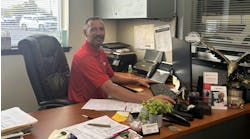BOLOGNA, Italy — Members of the American aftermarket are not alone. Many of the problems they are facing, Europeans are trying to work through in their own aftermarket.
During the second European Automotive Aftermarket Symposium (EAAS) at Autopromotec, key leaders of European aftermarket organizations shared their concerns and information on current topics including scrappage, the economy, testing, regulations and right to repair.
Michel Vilatte, president of the International Federation of Automotive Aftermarket Distributors (FIIEFA), says there are many schemes in the European countries now tied to vehicle scrappage. But he says the important piece needed is long-term ecological solutions.
“Alternatives do exist to support not just the aftermarket industry, but the whole automotive sector,” he says, adding that includes retrofitting cars, promoting environmentally sound maintenance such as improving engines and promoting proper financial incentives.
Massimo Brunamonti, president of the European Garage Equipment Association (EGEA), says there are other issues the European shops are facing, including roadworthiness testing. This is one difference in what American shops face, as there are no nationwide vehicle inspection programs.
Brunamonti says there needs to be pieces of testing added to these inspections, including ABS to the braking area, electronic stability control to suspension, Xenon lighting to the lighting area and more on-board diagnostics to the emissions area.
“Everything that allows us to use modern electronic instrumentation that allows garage owners to fix problems not only those that come upstream (are needed),” he says.
To help with these testings, the EGEA wants rules to create multibrand tools and equipment for service in a fast changing environment.
“This will facilitate the life of those that have to ensure these vehicles are roadworthy,” Brunamonti says.
Also, the need for information is a growing concern for this testing area and service as well.
The European aftermarket also is facing economic challenges like the United States. Vilatte says the low-cost phenomenon of aftersale concepts European dealers are experiencing is throwing new problems at the aftermarket. The shops now have to respond to high labor costs, cheaper material and other areas.
The shops also have to prove they can adapt and prepare for new technologies and compete with the dealers, Vilatte adds. This also ties in with free access to technical information, which many of the organizations spoke on during the EAAS.
Check out more of our detailed coverage of Autopromotec 2009.




